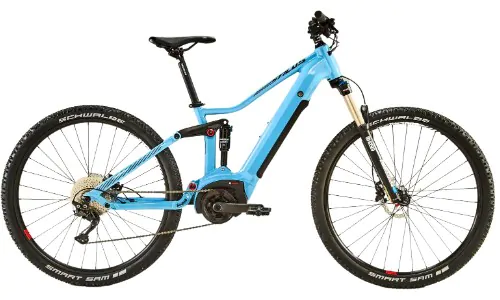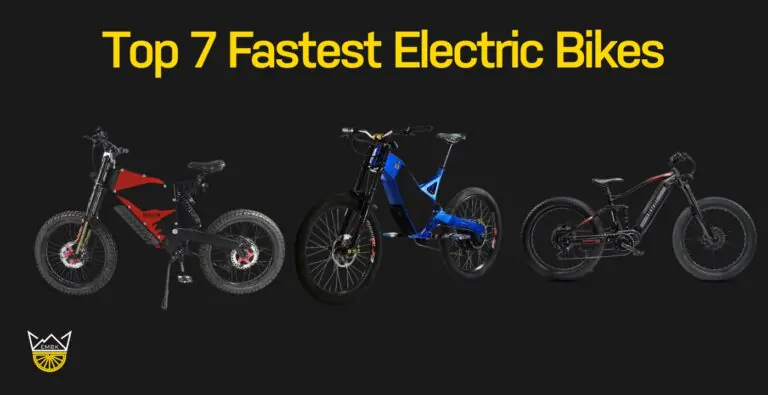The e-MTB industry has been advancing at a pace in recent years. Like all technology, greater market competition brings advancements in the industry, but what does that mean when it comes to price?
Why are e-MTBs More Expensive than Normal Mountain Bikes?
Whilst some aspects of e-MTBs are similar to conventional MTBs (the wheels, for example), there are also some key components on e-MTBs which a normal mountain bike doesn’t have – the battery and the motor, for instance.
These electrical components are the key areas which drive up the price, as they’re not cheap to make. Other areas of an e-MTB also need to be improved, with higher spec components, to help cope with the stress which the electrical components put the bike under.
Frames have to be stronger, the brakes need to be powerful, the chain more durable, etc. All of these add extra costs to an e-MTB, costs which a mountain bike simply doesn’t need to consider – or, at least, not to the same extent.
What are the Differences in Price Between an e-MTB and a Normal Mountain Bike?

Whilst some aspects of e-MTBs are similar to conventional MTBs (the wheels, for example), there are also some key components on e-MTBs which a normal mountain bike doesn’t have – the battery and the motor, for instance.
These electrical components are the key areas which drive up the price, as they’re not cheap to make. Other areas of an e-MTB also need to be improved, with higher spec components, to help cope with the stress which the electrical components put the bike under.
Frames have to be stronger, the brakes need to be powerful, the chain more durable, etc. All of these add extra costs to an e-MTB, costs which a mountain bike simply doesn’t need to consider – or, at least, not to the same extent.
Here are the general price brackets for a conventional mountain bike:
- Low budget: $650 – $1,500
- Mid budget: $1,500 – $3,500
- High budget: $3,500+
Here are the typical price brackets for an e-MTB:
- Low budget – $3,000 – $5,500
- Mid budget – $5,500 – $8,500
- High budget – $8,500+
Have e-MTBs Become Cheaper Over Time?
Electric mountain bikes certainly aren’t cheap and even the budget level ranges come in well above their non-electric powered counterparts. With advances in technology, though, it’s understandable to wonder whether electric mountain bikes will become cheaper over time?
Unfortunately, that time hasn’t come yet and it still looks quite a way off, for a number of reasons. Currently e-MTB manufacturers are battling it out to improve the performance of their bikes, by making them more powerful, with longer-lasting batteries, lighter or providing better handling.
All of that involves a lot of investment and means that, for now at least, prices remain comparatively high.
ℹ️ The key components of an e-MTB (the battery and motor) aren’t cheap to make and they often involve imported goods, which are susceptible to global prices changes – such as the raw materials in the lithium-ion batteries.
That’s not to say there won’t be a tipping point in the future, but we aren’t there yet. You can get very cheap, poorly made, e-MTBs, but they’re not reliable and often very heavy and fraught with issues.
Best Low-Budget e-MTBs ($3,500 - $5,500)
Decathlon E-ST Stilus
Price: $3,110
Who for: Beginner & leisure use – decent cheap electric mountain bike
Terrain: Forest track, dirt roads
Facts:
- Frame: Alloy
- Battery: Bosch PowerTube 500Wh
- Motor: Bosch (65Nm torque)
- Suspension: 130mm travel (front and rear)
- Wheels: 29in

Peaks:
- Best cheap option
- Decent power of motor and size of battery for price
- Good Shimano drivetrain
Troughs:
- Limited playfulness
- Poor geometry
- Weighty
Giant Stance E+2
Price: $3,024
Who for: Cross-country, entry level
Terrain: Singletrack, fairly moderate trail centre loops
Facts:
- Frame: Alloy
- Battery: Giant EnergyPak Smart 500Wh
- Motor: Giant SyncDrive (70Nm torque)
- Suspension: 120mm front travel, 130mm rear travel
- Wheels: 29in

Peaks:
- Robust
- Integrated battery
- Good traction
- Common in shops for easy-access maintenance
Troughs:
- Low level of travel
- Weighty
- Range
Cube Stereo Hybrid 140 HPC Pro 625
Price: $4,900
Who for: Moderate ability
Terrain: Classic trail riding, single-tracks
Facts:
- Frame: Carbon
- Battery: Bosch PowerTube 625Wh
- Motor: Bosch Performance Line CX (85Nm torque)
- Suspension: 140mm travel (front and rear)
- Wheels: 27.5in (XS & S frame sizes) 29in (M, L & XL frame sizes)

Peaks:
- Motor power
- Playfulness
- Good suspension
Troughs:
- Overall weight
- Long chainstays
Best Mid-Budget e-MTBs ($5,500 - $8,500)
Vitus E-Sommet VRX
Price: $6,844
Who for: Moderate ability
Terrain: Technical, enduro, climbing, descending
Facts:
- Frame: Aluminium
- Battery: Shimano E8036 (630Wh)
- Motor: Shimano Steps EP8 (85Nm torque)
- Suspension: 170mm front travel, 167mm rear travel
- Wheels: 29in front, 27.5in rear

Peaks:
- Descending
- Powerful
- Suspension
- Climbing
Troughs:
- Weight
- Range estimation
Price: $7,100
Who for: Fit riders, good level of ability, half-way house between e-MTB and MTB
Terrain: Technical, enduro, singletrack
Facts:
- Frame: Carbon
- Battery: Specialised SL1-320 (320Wh)
- Motor: Specialized SL 1.1 (35Nm torque)
- Suspension: 150mm travel (front and rear)
- Wheels: 29in

Peaks:
- Playfulness
- Light
- Natural power delivery
- Geometry
- Suspension
- Drive train
Troughs:
- Motor power
- Battery range
Orbea Rise H10 2023
Price: $7,830
Who for: Fit riders, good level of ability
Terrain: Technical, enduro
Facts:
- Frame: Carbon
- Battery: Orbea Internal (540Wh; 250Wh optional range extender)
- Motor: Shimano EP801-RS (60Nm torque)
- Suspension: 150mm front travel, 140mm rear travel
- Wheels: 29in front, 27.5in rear
Peaks:
- Playfulness
- Light
- Natural power delivery
- Geometry
- Drive train
Troughs:
- Motor power
- Amount of travel
Best High-Budget e-MTBs ($8,500+)
Rocky Mountain Altitude Powerplay Carbon 90 Rally Edition
Price: $10,640
Who for: All-day endurance riders
Terrain: Big mountains, single track, descending
Facts:
- Frame: Carbon
- Battery: Removable Integrated (720Wh)
- Motor: Dyname 4.0 Mountain Bike Drive (108Nm torque)
- Suspension: 170mm front travel, 160mm rear travel
- Wheels: 29in

Peaks:
- Incredibly powerful, expert climber
- Suspension
- Range
- Handling
Troughs:
- Display
- Geometry
Price: $15,900
Who for: Experienced & fit riders, elite level
Terrain: Downhill, jumps, technical, gnarly terrain
Facts:
- Frame: Carbon
- Battery: Specialized SL1-320 (320Wh)
- Motor: Specialized SL 1.1 (35Nm torque)
- Suspension: 170mm travel (front and rear)
- Wheels: 29in

Peaks:
- Suspension
- Lightweight
- Descending
- Climbing
- Handling
- Brakes
Troughs:
- Motor power
- Range
- Not good for unfit riders
Trek Rail 9.9 CX Race Gen 4
Price: $15,900
Who for: Experienced riders
Terrain: Enduro, technical, gnarly terrain, downhill
Facts:
- Frame: Carbon
- Battery: Bosch PowerTube (750Wh), smart system
- Motor: Bosch Performance Line CX Race Edition (85Nm torque)
- Suspension: 160mm front travel, 150mm rear travel
- Wheels: 29in

Peaks:
- Light
- Powerful
- Range
- Suspension
Troughs:
- Price
- Could be a little more playful given price
How Much Does an Electric Mountain Bike Cost? Final Thoughts
This is very much pointing out the obvious, but they’re lighter.
Manufacturers reduce the weight in a number of ways, including using lighter frame materials (usually carbon fibre) and using higher-spec components made out of lightweight (yet robust) materials, including the suspension.
However, the major factor comes down to the electrical components. Reducing weight often means that the electrical components, which weigh a lot, are smaller – so a smaller battery and a less powerful motor.
The average weight of an e-mountain bike is normally around 20kg to 26kg for the fully-assisted models. However, the new wave of super lightweight e-MTBs can be down at around 17kg and manufacturers are continuing to push that number down. But what benefits does this bring?






